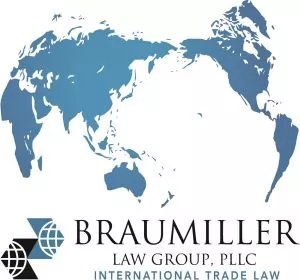Adrienne Braumiller is the founder of Braumiller Law Group PLLC and an innovative force in international trade law. With more than 25 years of experience, she is widely recognized as a leading authority in Customs, import, export, foreign-trade zones, free trade agreements and ITAR compliance. Adrienne has been involved in every aspect of import and export compliance, from developing compliance programs to conducting audits and assessments, representing clients who are under investigation and preparing and submitting voluntary disclosures. She's also involved in preparing and filing classification requests and licenses, analysing whether specific transactions should be pursued, providing tailored training on specific import/export topics, addressing penalty assessments, and serving as an expert witness in a number of trade cases.
Bob brings over 30 years of advertising and marketing experience to Braumiller Law Group, as well as Braumiller Consulting. He is responsible for all of the various marketing materials distributed to our client base on a regular basis, (as well as potential new clients).
After graduating from college, Bob began his marketing career with US Steel, Oilwell Division, in Dallas, and later started his own advertising business called RD Brewer & Associates. Bob was later recruited by Sabre Corporation as Director of Sales for Virtuallythere.com, the sister site to Travelocity.com. After 3 years with Sabre, Bob joined Braumiller Law Group in 2002.
Braumiller Law Group, PLLC, is a highly respected law firm focused on international trade compliance and proven strategies to optimize global trade business practices. The attorneys and trade advisors of Braumiller Law Group know exactly how to navigate the intricate maze of global trade regulations, and they have a successful track record for helping clients save millions of dollars in compliance penalties. These clients also leverage
the expertise and experience of the Braumiller Law Group team to ensure that their global trade operations are legally structured to maximize efficiency and profitability.
What advice could you give potential clients on effective pre-deal planning?
Look carefully at the target's cross-border activities and whether the target has internal controls dedicated to achieving import and export compliance. In our experience, many import and export non-compliance issues are found after the deal is closed. A common issue area we often discover is deficient or incorrect product classification codes for customs duty assessment purposes, triggering not only a change in the regular duties applicable, but also the application of safeguard duties (such as the 25% additional tariff on certain Chinese origin products). These occurrences can result in millions of dollars in liability.
When you think of mergers and acquisitions, what are the highest risk areas that spring to mind?
While companies routinely understand and prepare for liability pertaining to tort litigation, taxes, and contract disputes, the same companies often overlook potential liability for violations of import and export laws. Unfortunately, this can prove to be one of the most expensive oversights made during a merger or acquisition due diligence review, as the penalties for import and export violations can be significant. Consequently, any such due diligence review should include an audit for potential import and/or export liability concerns. While the threat of "buying" import or export violations through a merger or acquisition operations are legally structured to maximize efficiency and profitability.
is not new, the increased risk of acquiring or merging with a company with past violations remains high due to a number of factors, including the ongoing US trade war with China and the increased scrutiny on business with Huawei. A look at successor liability enforcement actions in both import and export contexts should clearly illustrate two critical points to companies: first, that successor liability is a concept that is alive and well in import and export law, and second, that enforcement agencies will not hesitate to employ the concept in issuing penalties for import or export violations.
Is there legal precedent for holding successors liable for the acts or omissions of predecessors in customs and trade cases?
Yes. One of the first cases to address the concept of successor liability in import laws was the 1989 case of United States v. Shield Rubber Corp. In this case, Shields Rubber Corporation was charged with violating several customs laws by removing country of origin markings. Shields Rubber Corporation had not actually performed these acts; rather, its predecessor company had removed the markings. Shields Rubber Corporation had merged with Shields Rubber Corporation II, and the successor thus protested it should not be liable for the actions of its predecessor. However, the U.S. Supreme Court found that the principles of merger law applied, and that the successor was liable for the violations of the predecessor. Even though this situation did not involve a sale of assets, it is important in case law history that it upholds the merger law doctrine. In another key case, United States v. Adaptive Microsystems, the Court of International Trade (CIT), without even asking whether successor liability applies to import cases, found a company liable for the transgressions of the company it had acquired under the mere continuation principle. In this case, Adaptive Microsystems, LLC went into bankruptcy and was acquired by another company, which ultimately continued Adaptive Microsystems operations with the same name, and with the same employees. Although the board of directors had changed (except for one person, who retained a fraction of the stocks he had in the previous company and his position on the board), CIT found that these facts rendered the company similar enough to the previous company to warrant holding the successor liable under the mere continuation doctrine. As a result, Adaptive Microsystems, LLC was liable to the government for the unpaid duties of the former company.
How likely is CBP to pursue a company under successor liability?
In BLG's experience, there are certain factors that make it more or less likely that Customs and Border Protection (CBP) will pursue a claim under successor liability for import violations. These include variables such as the amount of the lost revenue to CBP (such as unpaid duties), public policy considerations including the type of harm caused by the violation, and the possibility of the violation recurring under the predecessor, to name a few. In one recent case handled by BLG, a successor company was being investigated by CBP. The company had bought the assets of the prior company, and the prior company had then dissolved. According to common law, this would be considered a de facto merger and the successor might be on the hook for paying the lost revenue. However, in this instance, the amount was relatively low such that CBP would spend more pursuing it than they would obtain if successful. In addition, the asset agreement included an absolution of liabilities and debt for the purchasing company. Given the factors of a low dollar amount and the agreement to absolve liabilities, CBP accepted the argument that successor liability would not attach.
How likely is BIS or Department of State to pursue a company under successor liability?
Successor liability is even more commonly seen in export cases. One of the seminal cases in export law is the Sigma-Aldrich case from 2002. In this situation, Sigma-Aldrich Corporation (SAC) and Sigma-Aldrich Business Holdings (SABH) had purchased the partnership interests of another company and transferred the assets to Sigma-Aldrich Research Biochemicals (SARB). Through an investigation after the sale, the BIS found that the acquired company had exported biological toxins without a license. BIS then charged the three Aldrich-Sigma companies with the violations under successor rules. The judge held that all three Sigma-Aldrich companies were liable for the violations of the predecessor company and assessed a $1.76 million fine to settle the charges against them.
What are the top tips to avoid possibly "buying" the customs and export violations?
We recommend taking the following actions, at a minimum, when conducting preliminary reviews:
Exports
- Review export compliance procedures to understand current compliance framework
- Review terms of sale and PO terms and conditions
- Analyze voluntary disclosures (both historical and current) and internal audit reports
- Review CJ decisions, CCATS determinations, and advisory opinions
- Review list of current licenses and agreements, including applications currently pending, and consider whether any need to be amended as a result of the merger or acquisition
Imports
- Review import compliance procedures, including C-TPAT security policies, to understand the current compliance framework
- Review foreign vendor/supplier agreements and PO terms and conditions
- Analyze prior disclosures (both historical and current) and internal audit reports
- Review binding Customs rulings and scope decisions
Previously published on irglobal.com
https://www.braumillerlaw.com/using-external-expertise/
Check out our new Digital Magazine Get the inside scoop on the Braumiller Law Group & Braumiller Consulting Group "peeps." Expertise in International Trade Compliance.
The content of this article is intended to provide a general guide to the subject matter. Specialist advice should be sought about your specific circumstances.


